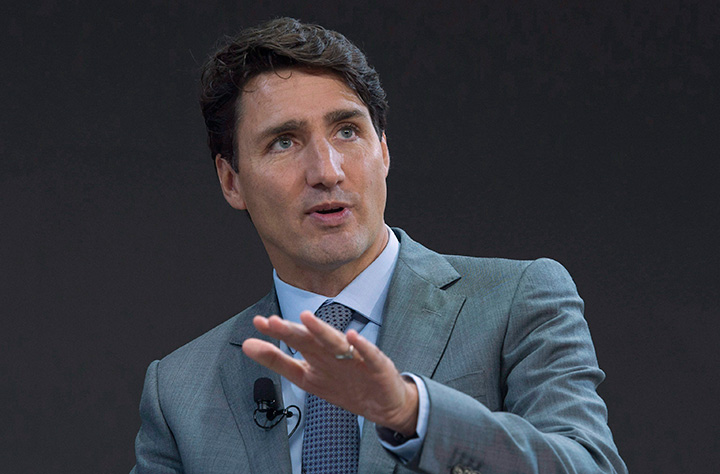Middle-income families face higher personal income taxes due to changes implemented by the Liberal government, finds a new report by the Fraser Institute.

While the government of Prime Minister Justin Trudeau reduced the marginal tax rates for income between $46,000 and $92,000, it also implemented other reforms that have resulted in most Canadians with children and middling incomes paying more, on net, in income taxes than they did before, according to the study.
READ MORE: Do Trudeau’s tax changes really only hit the rich?
The paper focuses on couples with children under the age of 18 and single parents. It finds that more than 80 per cent of families with incomes between just over $77,000 and $108,000, which the authors define as the middle class, are paying more in tax as a result of the federal income tax changes, with households paying $840 more on average.
Lower-middle-class families, those with household incomes between, roughly, $52,000 and $77,000 are paying $382 more on average, with nearly 70 per cent paying more.
READ MORE: Trudeau’s tax reforms: Here’s how the loopholes work
That’s also, roughly, the share of upper-middle-class families whose income tax bill has gone up. For them – the group making between nearly $108,000 and around $150,000 – the average increase is $938.
“The federal government has repeatedly claimed that it has cut income taxes for middle-class Canadian families,” the authors noted.
“The reality, however, is that the federal government has enacted other changes to the personal income tax system that have increased the amount of income tax that Canadian families pay,” they conclude.
WATCH: Morneau explains why closing tax loopholes helps average Canadians

The most important of those changes was the elimination of the so-called Family Tax Cut introduced by the Conservatives, which allowed eligible couples with minor children to split their income and save up to $2,000 in taxes each year.
(Income splitting generally allows one earner to transfer some of her or his income to a spouse or other family members in a lower tax bracket, which results in tax savings.)

Get weekly money news
On average, higher taxes resulting from the end of income splitting outweighed the tax reduction most families enjoyed when the Liberals reduced the second-lowest federal personal income tax rate from 22.0 to 20.5 per cent, the study finds.
This is true for all families except those with incomes of $150,385 and up, who saw no tax gains from the recent tax rate changes since the government also introduced a new, higher top income tax rate for high earners.
So, is the middle class worse off under the Liberals?
While the study provides an interesting breakdown of the net effects of recent income tax changes, it would be wrong to assume that it shows that “federal policy has hurt the middle class,” said Trevor Tombe, an economist at the University of Calgary.
READ MORE: Will Trudeau’s reforms really mean 73% tax for small business?
The report focuses narrowly on income tax changes, excluding a number of other reforms, such as higher payroll taxes to fund the expansion of the Canada Pension Plan.
Notably, this approach also means ignoring the Canada Child Benefit (CCB), which delivered a large payment to middle-class families with children, noted Rhys Kesselman, Canada Research Chair in Public Finance at Simon Fraser University.
“A dollar in your pocket from benefit improvements is worth as much as a dollar lost in taxes. And in key areas, the benefit increases exceed the additional taxes for middle-income families,” he told Global News via email.
“The combination of three provisions in 2015 inherited from the Conservative government (the Family Tax Cut, the child tax credit, and the Universal Child Care Benefit) were all replaced by the Liberal government in 2016 with the Canada Child Benefit, which distributed $2 billion more to families than the provisions that they replaced,” according to Kesselman.
WATCH: Trudeau speaks on tax changes, immigration during packed Kelowna town hall

Also, while the Universal Child Care Benefit (UCCB) provided a monthly transfer to all families with minor children, regardless of income, CCB amounts phase out as income grows, with families earning more than $200,000 receiving no benefit, noted Tombe.
The Family Tax Cut, which the Liberals eliminated, delivered the biggest tax gains to families with the greatest differential in marginal tax rates between earners in the household, said Lindsay Tedds, an economist and tax expert at the University of Victoria.
READ MORE: Tax changes do not impact family trusts or numbered companies, used by Trudeau, Morneau
According to the Fraser Institute, it was families making over $150,000 who drew the biggest tax advantage, saving on average just over $1,500.
The Family Tax Cut also yielded no benefits for single parents, noted Tedds.
“The CCB in contrast, which replaced the scheme, is of greatest benefit to households with the lowest household income,” she added.








Comments
Want to discuss? Please read our Commenting Policy first.